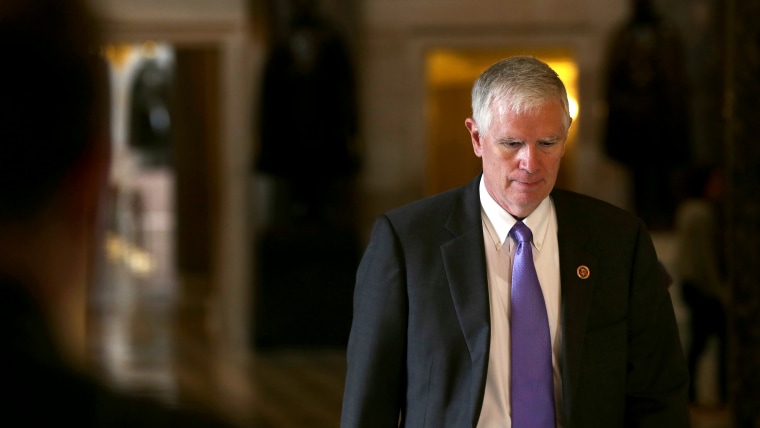When Sen. Lindsey Graham (R-S.C.) was confronted with new evidence, put together by his House Republicans allies, that Benghazi conspiracy theories are completely wrong, the Republican senator was angrily dismissive. The evidence, he said, must be "crap."
Denial can be a powerful emotional response, can't it? If the right believes President Obama's economic policies have failed, and they're confronted with evidence of a falling unemployment rate, then there must be a conspiracy involving the jobless numbers. If the right believes Benghazi conspiracies are real, and they're confronted with proof to the contrary, then the proof must be rejected.
But on Friday's "All in with Chris Hayes," Rep. Mo Brooks (R-Ala.) took this to a whole new level.
Brooks, you'll recall, believes President Obama's executive actions on immigration may be criminal acts that could land the president in prison. With this in mind, Chris asked a good question: "When President Reagan granted deferred action from 200,000 people from El Salvador who come here illegally, was he breaking the law in the same way?" It led to this exchange:
BROOKS: I have not examined what Bill Clinton did. This is a very serious manner. The Constitution imposes a heavy burden on us-- HAYES: No, no, no, I'm sorry. President Ronald Reagan. President Ronald Reagan, sir? BROOKS: I think the individual facts are important, the mental intent of the actor. That case, Bill Clinton, now Barack Obama, those factors are important.
At a certain level, the cognitive dissonance must be disorienting. Republicans are convinced Reagan was a man without flaw. Republicans are then confronted with the fact that Reagan relied on executive actions to change immigration policy when Congress' efforts fell short. That creates a problem: either Reagan took steps the right now finds abhorrent, or Obama's actions are neither shocking nor unprecedented.
What to do? Decide that Ronald Reagan's name is pronounced "Bill Clinton" when it comes to immigration policy.
Watching Brooks make the switch in real-time was truly extraordinary, but the "All In" exchange underscores an important point. Congressional Republicans generally don't return my calls, but what I desperately want to know is how they square the circle: Obama's actions on immigration are effectively identical to modern Republican presidents' actions on immigration. If the right wants to argue that Obama, Reagan, and H.W. Bush were all equally unlawful, fine. Conservatives may have been eerily quiet about this in the 1980s and 1990s, but if the newly radicalized Republican Party wants to believe that these GOP administrations were wrong, too, they'll at least have consistency on their side.
But in general, this isn't the argument. Rather, what we're hearing from the right is that Obama is a tyrannical monarch, overseeing a lawless presidency. And what about nearly identical actions from Reagan and Bush? The apparent Republican response is, "Hey look over there! Bill Clinton!"
Brooks' reaction may offer an extreme example, but these exchanges need not be uncommon -- basic questions will not go away because the right finds them uncomfortable. The right has had months to come up with an answer to a straightforward question: why are Obama's actions on immigration necessarily more outrageous than related actions from his recent predecessors.
So far, GOP officials haven't come up with much.
